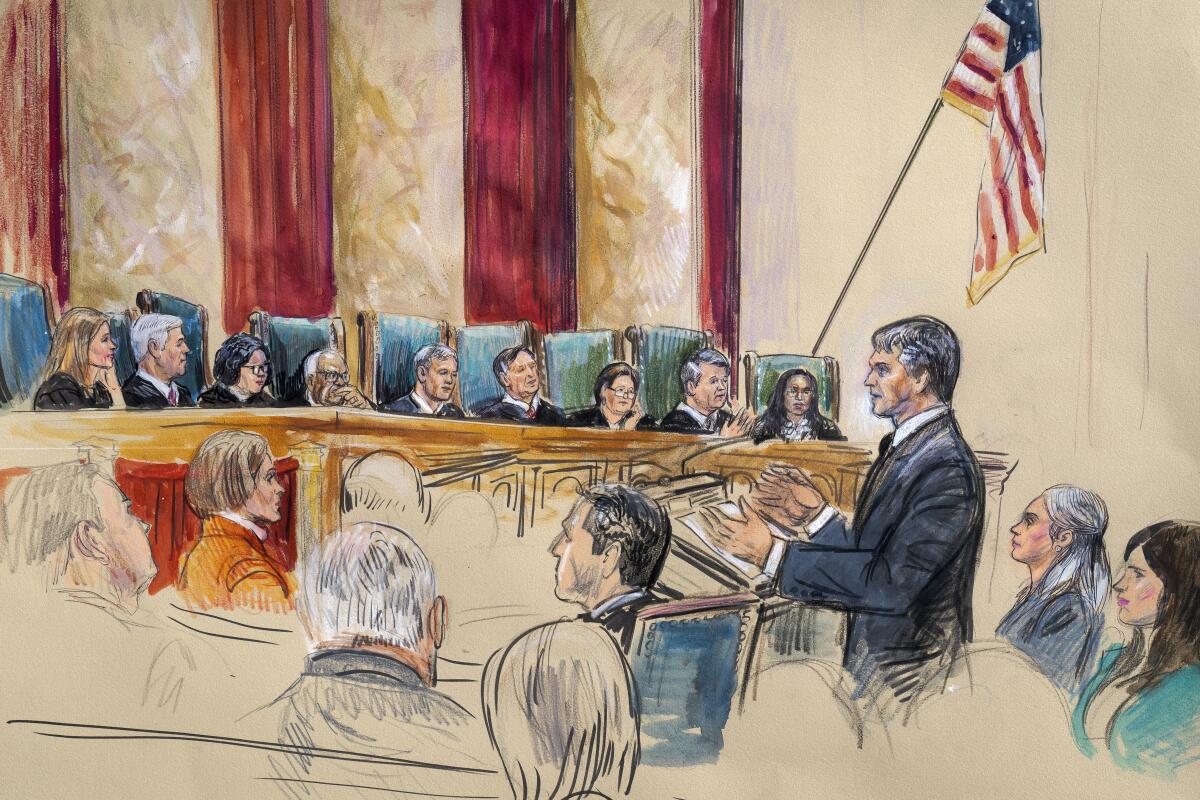Letters to the Editor: Trump has made the Supreme Court too afraid to uphold the Constitution

- Share via
To the editor: I heard an excellent argument put forth by a Yale professor of history who suggested that we either live by the rule of law or by fear.
Many fear violence that may result if former President Trump is disqualified from the 2024 election. That is the modus operandi of dictators: Create fear.
The U.S. Supreme Court, which heard arguments Thursday in the Trump disqualification case, must rule according to the law. If the justices allow themselves to be ruled by fear, then historians a century or two hence will look back on this period and laugh about how this democracy was destroyed by ridiculously twisted interpretations of the 14th Amendment.
We cannot be ruled by fear.
Zena Thorpe, Chatsworth
..
To the editor: Those calling for Trump’s disqualification from the ballot talk as if this is the only way the Democrats can win in 2024 — that the only path to victory is to have President Biden reinstalled by a small group of judges.
Has anyone thought of the political consequences of half the country seeing Biden as an illegitimate president?
Ray Hogenson, Sun Valley
..
To the editor: We don’t need to rely on the Supreme Court to keep Trump from the presidency. We need only rely on ourselves.
In California, all registered Republicans can vote in the Republican presidential primary. If you are not already a registered Republican, you can easily change your party affiliation by re-registering before March 5.
An overwhelming turnout for Republican candidate Nikki Haley in California (and every remaining primary state) could ultimately succeed in denying Trump the GOP nomination.
Helene Presskreischer, Needham, Mass.
..
To the editor: The Supreme Court’s parsing of the 14th Amendment, even though there is nothing to parse and it is so plainly written that even we lowly citizens can understand it, shines a light on the justices’ cowardice.
Cloaked in an argument that one state, following the words of our Constitution and acting in good faith, might somehow lead the federal government and the country around by its nose, the justices all but ignored the textbook example of the need for the 14th Amendment that this case presents.
This is frightening.
Martin Wauson, Anaheim
..
To the editor: It seems that a lot of people are missing what appears to be the logical conclusion of the intent of Section 3 of the 14th Amendment. It seems to me that this is the “fool me once, shame on you; fool me twice, shame on me” rule.
It doesn’t change any qualifications that the Constitution requires to hold these government positions; rather, it adds an exception for a very specific and potentially dangerous situation.
In the case of the office of the president, the Constitution doesn’t exclude someone who has been arrested or convicted of a crime and is even in prison. Section 3 of the 14th Amendment doesn’t change that.
Rather, it applies only to those who had sworn an oath to the Constitution, and then engaged in insurrection or rebellion against it. It’s a question of honor and integrity. The Constitution allows people to hold positions of great power, and requires only that officeholders honor their oath.
However, this disqualification isn’t even the final word, since the amendment allows someone to petition Congress to remove the restriction. What other criminal or civil prosecutions afford that type of relief?
Bill Lawrence, Hawthorne
..
To the editor: Oral arguments at the Supreme Court indicate that the justices’ likely excuse for letting Trump evade consequences for engaging in an insurrection will be the specious contention that Section 3 of the 14th Amendment is not self-executing but requires Congress to pass enforcement procedures.
To demonstrate the absurdity of this position, consider how the Supreme Court would deal with Barack Obama running for president for a third term. Would the court allow this obvious violation of the 22nd Amendment because Congress failed to enact supporting legislation?
John Weinell, San Clemente
..
To the editor: If Trump says Section 3 of the 14th Amendment doesn’t apply to him because the president is not an “officer” of the U.S., and the amendment doesn’t explicitly mention the president, then the same argument can be made of Article VI of the Constitution.
The final clause of Article VI says all federal and state legislators and judicial and executive officers are bound by oath or affirmation to uphold the Constitution, but no religious test shall ever be required as a qualification to hold any “office or public trust under the United States.”
So, if Article VI also does not involve the presidency, then Trump or any other president can be subjected to a religious test.
Trump’s “officer” argument seems rather absurd.
Ruben Jauregui, Hacienda Heights
..
To the editor: Of course the president is an “officer” under our Constitution. In fact, the president is the highest U.S. officer — commander in chief.
Jerry Rubin, Santa Monica






